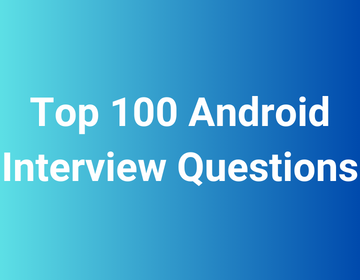Top 100 Android Interview Questions
In this article, I am going to list the top 100 interview questions to brush up on on Android before an interview. These 100 interview questions cover various aspects of Android development. Keep in mind that the depth and complexity of the questions may vary based on the job position and the level of expertise required.
Android Basics:
- What is Android?
- Explain the Android architecture.
- Describe the Android application components.
- Differentiate between Activity and Fragment.
- What is the AndroidManifest.xml file used for?
- Explain the Android application lifecycle.
- What is the significance of the ‘R’ in R.id and R.layout in Android?
- What is the purpose of the setContentView() method in Android?
- How do you handle different screen sizes in Android?
User Interface (UI) and Layouts:
- Explain the difference between RelativeLayout and LinearLayout.
- What is a RecyclerView and how is it different from a ListView?
- Describe the purpose of the ViewHolder pattern.
- What are the different types of layouts in Android?
- Explain the concept of a Fragment in Android.
- How can you optimize the performance of a RecyclerView?
- What is the purpose of the ViewGroup class in Android?
Intents and Broadcast Receivers:
- What is an Intent in Android?
- Differentiate between an Explicit and Implicit Intent.
- How do you pass data between activities using Intent?
- Explain the concept of Intent Filters.
- What is a PendingIntent in Android?
- How do you register a BroadcastReceiver in Android?
- Describe the purpose of the LocalBroadcastManager.
Services and Background Processing:
- What is a Service in Android?
- Differentiate between a started service and a bound service.
- Explain the concept of AsyncTask in Android.
- What is the JobIntentService in Android?
- Describe the role of the IntentService class.
Data Storage and Persistence:
- Explain the difference between SharedPreferences and SQLite database.
- What is the Room Persistence Library in Android?
- How do you perform database operations using Room?
- Describe the concept of ContentProvider in Android.
- What is the purpose of the CursorLoader class?
Networking and APIs:
- How do you perform network operations on the main thread in Android?
- Explain the purpose of AsyncTaskLoader in Android.
- What is Retrofit in Android?
- How do you parse JSON data in Android?
- Describe the purpose of the AsyncTask class in Android.
Fragments and UI Navigation:
- What is the significance of the FragmentTransaction class?
- How do you communicate between Fragments in Android?
- Explain the concept of the back stack in Android.
- What is the Navigation component in Android?
Permissions and Security:
- How do you request runtime permissions in Android?
- Describe the Android permission system.
- Explain the purpose of ProGuard in Android.
- What is SSL/TLS and how is it used in Android?
Advanced Topics:
- Describe the concept of Dependency Injection in Android.
- What is the Android NDK?
- How do you implement push notifications in Android?
- Explain the purpose of the Android ViewModel class.
- Describe the concept of Android Data Binding.
Testing:
- What is the purpose of JUnit in Android testing?
- How do you perform unit testing in Android?
- Describe the Espresso testing framework in Android.
Debugging and Profiling:
- How do you debug an Android application?
- Explain the purpose of the Android Profiler tool.
- What is ANR (Application Not Responding) in Android?
Tools and IDE:
- Describe the purpose of ADB (Android Debug Bridge).
- What is the Android Studio IDE and how is it different from Eclipse?
- Explain the purpose of the Gradle build system in Android.
Memory Management:
- What is a memory leak in Android?
- How does garbage collection work in Android?
UI/UX Design:
- What are Material Design guidelines in Android?
- Explain the purpose of the ConstraintLayout in Android.
Version Control:
- How do you manage version control in Android projects?
- Explain the purpose of Git in Android development.
Kotlin Specific Questions:
- What are the advantages of using Kotlin for Android development?
- How does Kotlin differ from Java in Android development?
Android Studio Tips:
- How do you create a new project in Android Studio?
- Explain the purpose of the Logcat window in Android Studio.
- What is the Instant Run feature in Android Studio?
Performance Optimization:
- How can you optimize the performance of an Android application?
- Explain the purpose of the Systrace tool in Android.
Google Play Store and Deployment:
- Describe the process of publishing an Android app on the Google Play Store.
- What is the purpose of the Android Package (APK)?
Did you know Flutter is one of the most common features in the upcoming days of apps? Brush up on your knowledge with my article, top 100 flutter interview questions.
Security Best Practices:
- How can you secure sensitive information in an Android app?
- Explain the purpose of the Android KeyStore system.
Continuous Integration and Continuous Deployment:
- What is CI/CD in Android development?
- Describe the purpose of Jenkins in Android CI/CD.
Accessibility:
- How do you ensure accessibility in Android applications?
Kotlin Coroutines:
- What are Kotlin Coroutines, and how do they differ from traditional threading?
Android Architecture Components:
- Explain the purpose of LiveData in Android.
- What is the ViewModel in Android Architecture Components?
- How do you use Room with Android Architecture Components?
Location and Maps:
- How do you retrieve the device’s location in Android?
- Describe the integration of Google Maps in an Android app.
Design Patterns
- Explain the singleton design pattern in Android.
- Describe the Observer pattern and its use in Android.
Dependency Management:
- What is the purpose of dependencies in Android development?
- How do you add dependencies in an Android project using Gradle?
Kotlin Flow:
- What is Kotlin Flow, and how does it handle asynchronous programming?
Memory Profiling:
- How do you analyze memory usage in an Android app?
- What is the purpose of the Memory Profiler in Android Studio?
Testing Frameworks:
- Explain the purpose of the Android JUnit testing framework.
- What is the purpose of the Mockito library in Android testing?
App Signing:
- How do you sign an Android app before releasing it on the Play Store?
Publishing and Monetization:
- What are the different app publishing models on the Play Store?
- How can an Android app be monetized?
WorkManager:
- What is WorkManager, and how does it simplify background tasks in Android?
Jetpack Compose:
- What is Jetpack Compose, and how does it change the way UI is built in Android?
These questions cover a broad range of topics related to Android development. Depending on the specific role and job requirements, interviewers may focus on certain areas more than others. It’s crucial to have a good understanding of the fundamentals and stay updated on the latest developments in the Android ecosystem.




Pingback: Top 100 Flutter Interview Questions - AppsDial